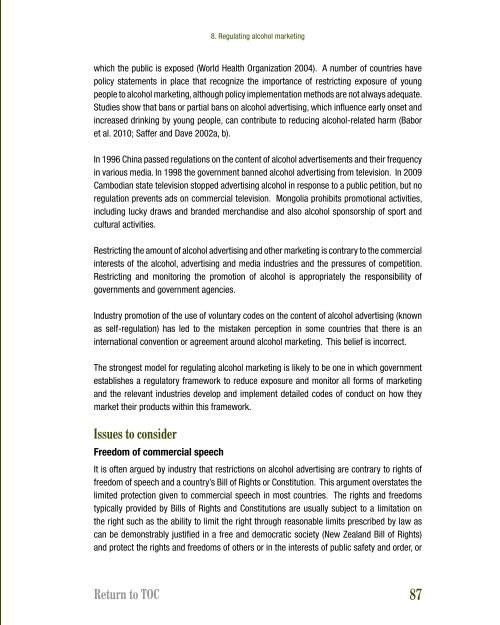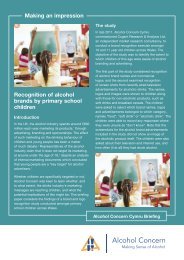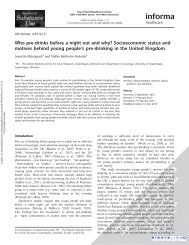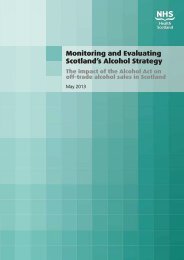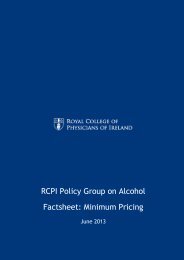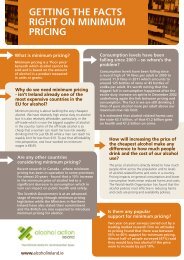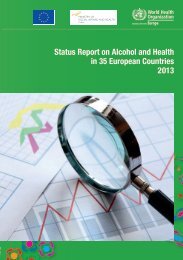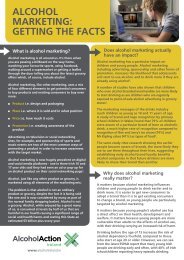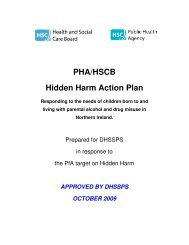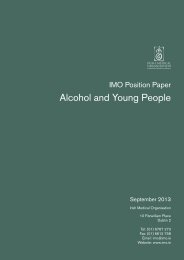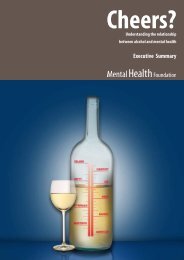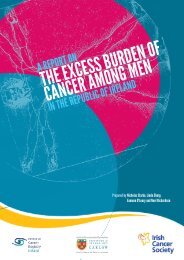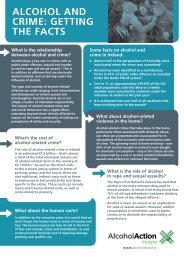Addressing the harmful use of alcohol - WHO Western Pacific Region
Addressing the harmful use of alcohol - WHO Western Pacific Region
Addressing the harmful use of alcohol - WHO Western Pacific Region
Create successful ePaper yourself
Turn your PDF publications into a flip-book with our unique Google optimized e-Paper software.
8. Regulating <strong>alcohol</strong> marketing<br />
which <strong>the</strong> public is exposed (World Health Organization 2004). A number <strong>of</strong> countries have<br />
policy statements in place that recognize <strong>the</strong> importance <strong>of</strong> restricting exposure <strong>of</strong> young<br />
people to <strong>alcohol</strong> marketing, although policy implementation methods are not always adequate.<br />
Studies show that bans or partial bans on <strong>alcohol</strong> advertising, which influence early onset and<br />
increased drinking by young people, can contribute to reducing <strong>alcohol</strong>-related harm (Babor<br />
et al. 2010; Saffer and Dave 2002a, b).<br />
In 1996 China passed regulations on <strong>the</strong> content <strong>of</strong> <strong>alcohol</strong> advertisements and <strong>the</strong>ir frequency<br />
in various media. In 1998 <strong>the</strong> government banned <strong>alcohol</strong> advertising from television. In 2009<br />
Cambodian state television stopped advertising <strong>alcohol</strong> in response to a public petition, but no<br />
regulation prevents ads on commercial television. Mongolia prohibits promotional activities,<br />
including lucky draws and branded merchandise and also <strong>alcohol</strong> sponsorship <strong>of</strong> sport and<br />
cultural activities.<br />
Restricting <strong>the</strong> amount <strong>of</strong> <strong>alcohol</strong> advertising and o<strong>the</strong>r marketing is contrary to <strong>the</strong> commercial<br />
interests <strong>of</strong> <strong>the</strong> <strong>alcohol</strong>, advertising and media industries and <strong>the</strong> pressures <strong>of</strong> competition.<br />
Restricting and monitoring <strong>the</strong> promotion <strong>of</strong> <strong>alcohol</strong> is appropriately <strong>the</strong> responsibility <strong>of</strong><br />
governments and government agencies.<br />
Industry promotion <strong>of</strong> <strong>the</strong> <strong>use</strong> <strong>of</strong> voluntary codes on <strong>the</strong> content <strong>of</strong> <strong>alcohol</strong> advertising (known<br />
as self-regulation) has led to <strong>the</strong> mistaken perception in some countries that <strong>the</strong>re is an<br />
international convention or agreement around <strong>alcohol</strong> marketing. This belief is incorrect.<br />
The strongest model for regulating <strong>alcohol</strong> marketing is likely to be one in which government<br />
establishes a regulatory framework to reduce exposure and monitor all forms <strong>of</strong> marketing<br />
and <strong>the</strong> relevant industries develop and implement detailed codes <strong>of</strong> conduct on how <strong>the</strong>y<br />
market <strong>the</strong>ir products within this framework.<br />
Issues to consider<br />
Freedom <strong>of</strong> commercial speech<br />
It is <strong>of</strong>ten argued by industry that restrictions on <strong>alcohol</strong> advertising are contrary to rights <strong>of</strong><br />
freedom <strong>of</strong> speech and a country’s Bill <strong>of</strong> Rights or Constitution. This argument overstates <strong>the</strong><br />
limited protection given to commercial speech in most countries. The rights and freedoms<br />
typically provided by Bills <strong>of</strong> Rights and Constitutions are usually subject to a limitation on<br />
<strong>the</strong> right such as <strong>the</strong> ability to limit <strong>the</strong> right through reasonable limits prescribed by law as<br />
can be demonstrably justified in a free and democratic society (New Zealand Bill <strong>of</strong> Rights)<br />
and protect <strong>the</strong> rights and freedoms <strong>of</strong> o<strong>the</strong>rs or in <strong>the</strong> interests <strong>of</strong> public safety and order, or<br />
Return to TOC<br />
87


